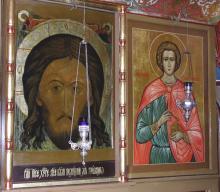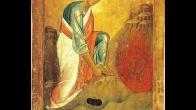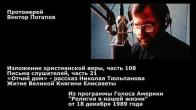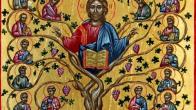You are here
Holy Great Martyr and Healer St. Panteleimon
27 July / 9 August
 The Great Martyr and Healer St. Panteleimon was born in the city of Nicomedia into the family of Eustorgios, an illustrious pagan, and was given the name Pantoleon. His mother Euvula was a Christian. She wanted to raise her son in the Christian faith, but she died when the future great martyr was but a youth. Pantoleon’s father entered him into a pagan elementary school; after his graduation, the youth began to study medicine with Euphrosynos, a physician well known in Nicomedia ; Emperor Maximian (284-305) heard of him, and wanted to see him at the palace.
The Great Martyr and Healer St. Panteleimon was born in the city of Nicomedia into the family of Eustorgios, an illustrious pagan, and was given the name Pantoleon. His mother Euvula was a Christian. She wanted to raise her son in the Christian faith, but she died when the future great martyr was but a youth. Pantoleon’s father entered him into a pagan elementary school; after his graduation, the youth began to study medicine with Euphrosynos, a physician well known in Nicomedia ; Emperor Maximian (284-305) heard of him, and wanted to see him at the palace.
At that time, the Hieromartyr priests Hermolaus, Hermippos and Hermokrates, who had survived the burning of 20,000 Christians in the Church of Nicomedia in the year 303, were living in secret in Nicomedia . More than once, St. Hermolaus saw Pantoleon going past his place of refuge. Once, the presbyter called the youth to come into his home, and told him of the Christian Faith. After that, Pantoleon visited Hieromartyr Hermolaus every day.
The youth once happened to see on the street a child that had been bitten by a great snake that was still nearby. Pantoleon began to pray to our Lord Jesus Christ that the dead child be resurrected and that the poisonous reptile might die. He firmly resolved that should his prayers be answered, he would become a follower of Christ and would accept Holy Baptism. Pantoleon saw the child come back to life, and the great viper burst into pieces.
Following this miracle, Pantoleon was baptized by St. Hermolaus with the name Panteleimon (all-merciful). In discussions with Eustorgius, St. Panteleimon prepared him for conversion to Christianity; when his father saw his son heal a blind man by invoking the Name of Jesus Christ, he came to believe on Christ, and was baptized, along with the man who had regained his sight.
After his father’s death, St. Panteleimon dedicated his life to the suffering, sick, needy and indigent. Everyone who came to him, he treated pro bono, healing them by invoking Jesus Christ. He would visit those in prison, especially Christians, whose numbers filled all of the prisons, and healed their wounds.
Soon, word of the merciful physician spread throughout the entire city. Forsaking other physicians, the people of the city turned only to St. Panteleimon for medical care.
Out of jealousy, physicians told the emperor that St. Panteleimon was treating Christian prisoners. Maximian attempted to persuade the Saint to rebut the reports and to offer sacrifice to the idols, but St. Panteleimon confessed himself to be a Christian, and in the presence of the emperor, healed a paralytic by calling on the Name of Jesus Christ. Enraged to hear the healed paralytic praising Christ, Maximian had him executed, and he had Panteleimon submitted to the cruelest of tortures.
The Lord appeared to the Saint and strengthened him before his trials. Great Martyr Panteleimon was suspended from a tree, was raked with iron claws, burned with torches, stretched on a wheel, thrown into boiling oil, and then cast into the sea with a heavy stone around his neck. Throughout all of the trials, the Great Martyr remained unharmed, and courageously rebuked the Emperor.
At the same time, the Priests Hermolaus, Hermippos and Hermokrates were brought before the pagan court. All three resolutely confessed their faith in the Savior, and were beheaded.
At the emperor’s order, Great Martyr Panteleimon was thrown to the wild beasts in the circus to be torn asunder. However, the wild animals licked his feet and crowded to touch the Saint’s hands. The audience rose up from their seats and began to shout “Great is the Christian God!” Enraged, Maximian ordered his soldiers to cut down with their swords anyone who praised the Name of Christ, and to behead Panteleimon.
They brought the Saint to the place of execution, and tied him to an olive tree. While the Great Martyr was praying, one of the soldiers struck him with a sword, but the sword turned soft as wax, and caused him no harm. When the Saint had finished his prayers, a voice could be heard, calling the Passion-bearer by name, and summoning him to the Heavenly Kingdom . On hearing the voice from Heaven, the soldiers fell to their knees before the Holy Martyr and begged his forgiveness. The executioners refused to go on with the execution, but Great Martyr St. Panteleimon ordered that they obey the emperor’s orders, and said that otherwise they would have no share with him in the life to come. In tears, and kissing the Saint, the soldiers bade him farewell.
When the Martyr was beheaded, milk flowed from his wounds. At the moment of his death, the olive tree to which he had been tied burst forth with fruit. Many who witnessed the execution came to believe on Christ. The Saint’s body, thrown onto a bonfire, remained unharmed by the flames, and was given a Christian burial (†305). Great Martyr St. Panteleimon’s servants Laurence, Vassos, and Provian witnessed his execution and heard the voice from Heaven. They recorded the story of the Holy Great Martyr’s life, sufferings, and martyric death.
Particles of Great Martyr St. Panteleimon’s holy relics were distributed throughout the entire Christian world. His most-honorable head is now in the Russian Monastery of Great Martyr St. Panteleimon on > Mt. Athos . In our church, a relic is housed in the right cuff in a large icon of the Great Martyr, next to the ancient “Not Made by Hands” Icon of the Savior in the lower “assembled” row of the Icon Screen.
In the Orthodox Church, Great Martyr St. Panteleimon is revered as an awesome and powerful saint, patron of soldiers. His original name, Pantoleon, which means “in all ways like unto a lion”, explains that aspect of his veneration. His name at Baptism, Panteleimon, i.e. “all merciful,” refers to his veneration as a healer. Among Western Christians, he is considered to be the patron saint of physicians. One can see a connection between the two aspects of his veneration, for soldiers, more often than others, sustain wounds, and are thus most in need of a physician-healer. This is why Christians, who wage spiritual battle, likewise run to this Saint with a plea to be healed of spiritual wounds.
The name of Holy Great Martyr St. Panteleimon is invoked during the Mystery of Holy Unction, during the Blessing of the Waters, and in prayers for the sick.
PARISH LIFE
Address of our Cathedral
Subscribe to our mailing list
While all the materials on this site are copyrighted, you may use them freely as long as you treat them
with respect and provide attribution on the Russian Orthodox Cathedral of St.John the Baptist of Washington DC.









